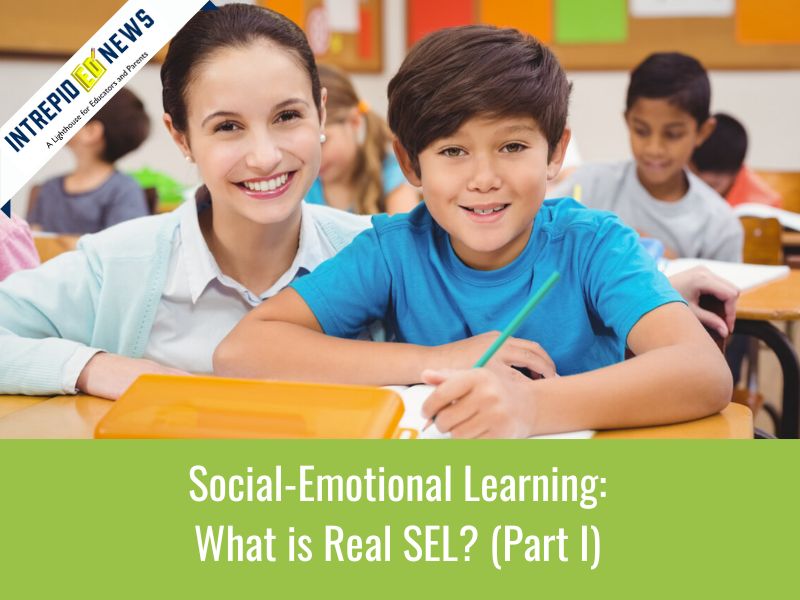This article is republished with permission from IntrepidEd News
Anabel Jensen
This is Part I of a three-part series on Real SEL. Part II will address how one develops SEL skills and Part III will tackle how one retains those skills under a variety of circumstances.
The answer depends on whom you are asking. An administrator might respond with, “SEL is a school curriculum on specific course material for teaching social and emotional skills.” A parent might state,” SEL is a program for helping my child build and maintain friendships.” A teacher might define SEL as “a class held once a week for students to learn to self-monitor and self-manage their internal feelings.” A researcher might describe SEL as “a set of tools for improving the learning environment.” A psychologist might get very specific and say the following, “Emotion has a substantial influence on the human cognitive processes in humans, including perception, attention, learning, memory, reasoning, and problem-solving. Emotion also facilitates encoding and helps to speed the retrieval of information efficiently” (Chai Tyng, Fafeez Amin, et. al, 2017). Or, a curriculum developer might describe SEL as, “a set of activities for improving character development or developing a conscience.” Business writers Cooper and Swarf (1997) might define SEL as, “a set of executive functions skills necessary for entrepreneurs.” And, the list continues.
All would be right. And, all would be wrong.
I, personally, because I have performed each of the jobs listed above — administrator, teacher, researcher, curriculum designer, psychologist, parent — believe SEL is like art; it is in the eye of the beholder. So, for me, and I consider myself a pioneer in the field of emotional intelligence, “SEL is a set of competencies (such as pattern recognition, optimism, motivation, consequential thinking, empathy, etc.,) that correlate with the following:
- Increased academic achievement
- Reduced risky behaviors, such as dependence on alcohol and drugs
- Improved and enriched relationships between boss and employee, between student and teacher, husband and wife, friend to friend
- Finding and sustaining a purpose in life
In other words, SEL is what it produces, what it creates, what it reinforces! What boss doesn’t want the above for their employees? What friend does not want this for everyone they know? What parent does not want this for their child or teenager?
Probably the most important person to ask about what SEL learning is — will be the individual for whom the concept was conjured — the toddler, the pre-schooler, the child, or the teenager.
Let’s start with Aaron.
Aaron was admitted to a K-8 independent school for his intellectual energy and curiosity. His parents, both academics, believed in the school’s mission and felt a school centering on social-emotional learning would be a good opportunity for him to thrive. During his first year, he began having emotional outbursts during class, on the playground, or in lines. His teachers, the SEL specialist, and the counselors partnered with his parents to find strategies that Aaron could use at home and at school to articulate his feelings without disrupting other learners. Academics were another story. Aaron held himself to high standards and completed his assignments on time with a lot of effort. He loved the hands-on learning, asked layers of questions, and volunteered to “go first” with experiments.
By the time Aaron reached third grade, his growing physical stature compounded his social-emotional difficulties. His raised voice would escalate to include aggressive and defensive protections, such as throwing dodgeballs and pencils at other children. Of course, the school took these incidents seriously in its pledge to create a physically safe environment for all those enrolled. Aaron received school consequences for his behavior and orchestrated apologies to other students with notes, gifts, and acts of service. Even given these difficulties, Aaron’s teachers continued to deliver a positive message to him: “We are not upset at you. We are upset at the behaviors. You are a good kid, Aaron. Do you know that about yourself? Do you believe that about yourself? We believe in you. We see you are upset about your behavior, too. Let’s see what strategies we can try for a different outcome.”
While not apparent at the time, Aaron was yearning for close connections — with his peers, his teachers, his parents. He wanted to feel accepted. He wanted to be a good friend. He wanted to be someone that others wanted to be around. In consultation with the school administration, Aaron’s parents sought support from outside psychologists and a psychiatrist. This marked a positive transition into middle school.
Fast forward to his eighth-grade graduation. As per tradition, each eighth grader can host a forum where they showcase a final project and reflect on their experience growing up on campus. Aaron’s final project was to leave a legacy of empathy at the school by establishing a welcoming, safe room on campus where students can go when they aren’t feeling accepted.
Aaron was allowed to choose which teachers, mentors, and friends to invite and — to everyone’s shock — Aaron invited his early elementary school teachers, including the kindergarten teacher who helped him with his meltdowns and the third-grade teacher who advocated for his suspension when he had hurt other students. Not only did Aaron and his parents tearfully express their gratitude to the faculty, but also his male friends articulated what meaningful, fun, and caring relationships he had created with each of them. Every teacher left the presentation saying, “When people ask me if SEL really works, I can tell them this story of transformation. This student left with a fire to create change, and the world will be much better for it.”
























